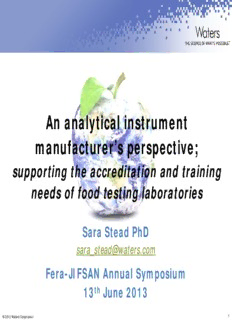
An analytical instrument manufacturer's perspective; - JIFSAN: IFSTL PDF
Preview An analytical instrument manufacturer's perspective; - JIFSAN: IFSTL
An analytical instrument manufacturer’s perspective; supporting the accreditation and training needs of food testing laboratories Sara Stead PhD [email protected] Fera-JIFSAN Annual Symposium 13th June 2013 ©2013 Waters Corporation 1 Overview Food testing analysis requirements & challenges – “the big five” The regulatory perspective? Technology solutions to solve real world challenges – Case study 1; ASAP for rapid testing of export samples Demonstrating “fitness for purpose” – Case study 2; Validation of a multi-residue method accordance with regulatory criteria Making the customer successful – Supporting capacity building & training priorities ©2013 Waters Corporation 2 Food analysis – requirements? the “big five” Robust Rapid multi-class quantitative screening analytical tools Simplified “Ease of extraction operation” protocols Identification of “unknowns” ©2013 Waters Corporation 3 Quantitative trace residue analysis What challenges do our customers face? Matrix & analyte complexity Validation & Sample type & AQC extract requirements preparation Compliance with Ease of use & regulatory implementation performance criteria ©2013 Waters Corporation 4 Complying with the regulatory framework the “day-to-day” challenges Regulated market sector Regulations vary with geography Trade barriers? Permitted residue levels Authorised compounds, e.g. ractopamine Requirement to validate method performance & monitoring ongoing AQC Drive to harmonise the regulations globally (CODEX, WHO FAO) International standards for food safety Many countries choose to implement the criteria of the countries they export to • EU has criteria for “third countries” ©2013 Waters Corporation 5 Regulations may define the choice of analytical method employed Suitable for use as confirmatory assays ) y for BANNED compounds t i Techniques Suitable for use as v I i t n suitable for confirmatory assays c c e re screening for permitted el a s s assays MS/MS compounds ( in e t g a p LC/GC-MS n o i m t e i r n c t LC-F s i a i d l f o o t r y in LC-UV t i t l i e b r a f e g r e ELISA n n i s c a e Microbiological e s r c n I ©2013 Waters Corporation 6 Instrument manufacturers role? Meeting the ne eds of the industry Regulatory Current analytical challenges? Requirements? Sample complexity Permitted limits Sensitivity Banned residues Informed product Selectivity Validation and AQC development via Speed of analysis effective communication Emerging risks? Future directions Residue scares and trends? Consumer safety Horizon scanning Toxicological assessments ©2013 Waters Corporation 7 Deployment of technology solutions to solve complex analytical challenges ©2013 Waters Corporation 8 Case Study -1 Strategy for rapid analysis 2011 plasticizer incident in food exports from Taiwan ©2013 Waters Corporation 9 Background 2011 plasticiser incident in Taiwan Di(2-ethylhexyl) phthalate (DEHP): general purpose plasticizer used to make soft / pliable plastics Toxicity – 20 times more toxic than melamine! – Classified as class B2 (probable human carcinogen) Regulations – Dissolved DEHP maximum level must not exceed 1.5 ppm – International TDI between 1.2 - 8.4 mg /60 kg adult May 2011 Taiwan FDA found DEHP in powdered probiotics – Product recall, traced back “clouding agent” food additive – Rigorous tests were carried out on six categories of food & beverages including: Sports, fruit and tea drinks o Jam and jellies o Food powders o Health supplement tablets o Rapid screen for the presence of DEHP using a simple technique with minimal sample preparation and no chromatographic separation was required… ©2013 Waters Corporation 10
Description: